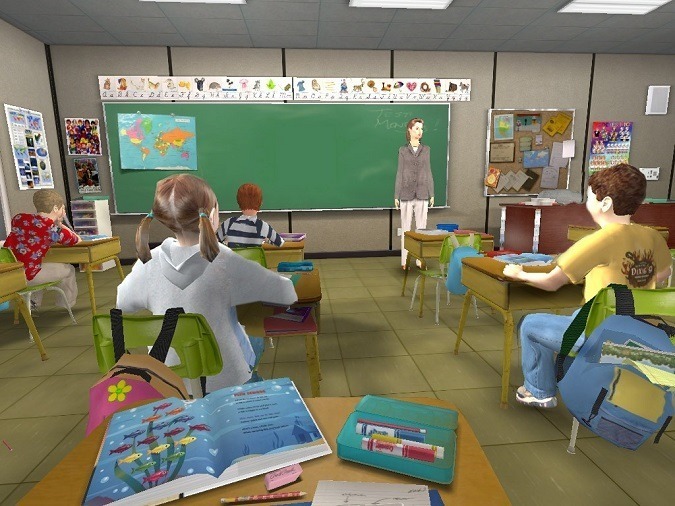Initial study finds promise and limitations in using virtual reality (VR) to treat ADHD
 ___
___
Given the limitations of existing evidence-based ADHD treatments, i.e., stimulant medication and behavior therapy — research on novel intervention approaches continues to be important.
Cognitive training is one such approach that has been suggested as a potential adjunct or even replacement for medication treatment. While cognitive training takes different forms, e.g., computerized attention training, working memory training, the basic idea is that by repeatedly practicing cognitive tasks related to attention, one’s ability to focus and attend will improve. In other words, attention will improve with practice, just as many other skills do. In my view, the evidence supporting this hypothesis is limited in that although gains are generally found on tasks similar to those used in training, generalization of gains to real-world tasks where sustaining attention is important, e.g., while reading, doing homework, etc., have been more difficult to document.
In recent years, virtual reality (VR) has been introduced as a treatment for several psychiatric disorders, particularly anxiety disorders; positive findings have been reported. In VR treatment for anxiety disorders, the client is ‘exposed’ to sources of anxiety in the virtual environment, allowing for gradual exposure in a controlled setting. For example, in the treatment of PTSD, VR allows a person to experience the trauma scenario again in a safe, controlled way through the use of interactive computer-generated environments that can be modified to resemble the traumatizing event. Using VR for ADHD has never been tested, however. A recent study thus represents an initial effort to examine this approach.
The New Study
In this study, Virtual Remediation Versus Methylphenidate to Improve Distractibility in Children With ADHD: A Controlled Randomized Clinical Trial Study, 51 7- to 11-year old children diagnosed with ADHD were randomly assigned to a virtual reality intervention, medication treatment, or supportive psychotherapy. Before and after treatment, which lasted 6 weeks, ADHD symptoms were assessed via a parent rating scale, a computerized attention test, and a virtual classroom assessment task.
In the latter, participants wore VR headsets that placed them ‘inside’ a virtual classroom. A virtual ‘teacher’ instructed them to view a series of letters on a blackboard and to click the mouse when a particular combination of letters appeared on the board. To make the task more difficult, multiple distractors, e.g., pencils dropping, paper airplane flying across the class, etc., were presented during the task. Correct responses were defined by clicking the mouse after the designated letters appeared; clicking to any other combination of letters were considered errors.
Treatment lasted 6 weeks. Children in the medication group were treated with a long acting form of methylphenidate with dose titrated every 2 weeks based on a parent interview. The psychotherapy condition was primarily focused on providing emotional support and addressing the impact of ADHD on children’s everyday lives; it was included primarily to control for therapist attention.
In the Virtual Reality condition, children wore VR headsets that simulated a regular classroom. During 12 30-minute training sessions, children performed a letter detection task (details not provided) while inhibiting attention to various classroom distractions. As training progressed, the distractors increased to make the task more difficult. You may note that the training task sounds very similar to the assessment task described above; from the description provided in the paper, it is not evident how they differed.
Results
On the virtual classroom assessment, youth who completed cognitive training in the VR environment showed improved performance that exceeded students in the psychotherapy condition and that matched that found for students receiving medication. Furthermore, they actually made significantly fewer errors than students in the medication group (it was not clear, however, whether students were on medication at the second assessment).
When it came to parent ratings of ADHD symptoms, however, there was no evidence that the VR training had any positive impact. In contrast, as has been demonstrated in numerous studies, youth treated with medication had significant and substantial reductions in both inattentive and hyperactive symptoms.
Summary and Implications
This study is an interesting initial effort to examine VR in the treatment of ADHD. However, although the VR intervention showed positive effects on the VR assessment task, this is not surprising given how similar the assessment was to the actual intervention. Because of this similarity, it is not clear that the VR component was essential as practicing a similar computer-based task outside of the VR environment could have yielded similar results. In that regard, a stronger control would have been a computer-based attention training task that did not include VR. Another limitation, as noted above, is that the VR intervention had no discernible impact on parents’ behavior ratings.
While the results of this study are limited, they highlight some important principles in evaluating novel ADHD treatments. For example, when training studies report treatment effects, it is not uncommon to find that benefits were obtained on some particular measure. In the study above, the positive impact on performance in the VR assessment could be highlighted.
It is important, however, to ask whether the outcome affected is a meaningful one. Most professionals and parents would be more interested in how a treatment impacts core ADHD symptoms than on how it may affect performance on a specific lab-based test. Thus, in my opinion, the failure to observe reductions in parents’ reports of ADHD symptoms substantially undermines the value of the intervention tested here.
Another issue to consider is how closely the measures used to evaluate an intervention’s impact match the intervention itself. In this study, the VR assessment measure was highly similar to what occurred in the VR training; this alone could explain why children got better on the task. Ideally, the intervention effects should generalize to ‘real world’ tasks and/or settings that are differ from the training itself.
For example, while it is nice to show that a computer-based attention training intervention leads to better scores on a computerized attention measure, it is more important to document that attention also improves in settings that really matter, e.g., while the child is doing homework or in the classroom.
In conclusion, while I commend the authors for this initial effort to examine the use of VR in ADHD treatment, there is much work remaining to establish whether this a viable approach. Taking a cue from the VR treatments developed for anxiety disorders, where VR is used to expose clients to ‘environments’ that elicit anxiety, it may be fruitful to use a virtual classroom environment to train attention during more meaningful academic tasks. For example, it may be possible to combine neurofeedback with a virtual classroom to provide feedback to children on their attention level as the ‘teacher’ presents an actual lesson.
This seems as though it could be an interesting approach to try.
 – Dr. David Rabiner is a child clinical psychologist and Director of Undergraduate Studies in the Department of Psychology and Neuroscience at Duke University. He publishes the Attention Research Update, an online newsletter that helps parents, professionals, and educators keep up with the latest research on ADHD.
– Dr. David Rabiner is a child clinical psychologist and Director of Undergraduate Studies in the Department of Psychology and Neuroscience at Duke University. He publishes the Attention Research Update, an online newsletter that helps parents, professionals, and educators keep up with the latest research on ADHD.
Related articles:
- Study suggests the real deficit underlying Attention Deficit Disorders is not Attention, but Working Memory
- What are cognitive abilities and how to boost them?
- Study shows why children with ADHD should be reevaluated each year: Attention problems perceived by teachers are far less stable than we imagine
- Rates of ADHD diagnosis and medication treatment continue to increase substantially


